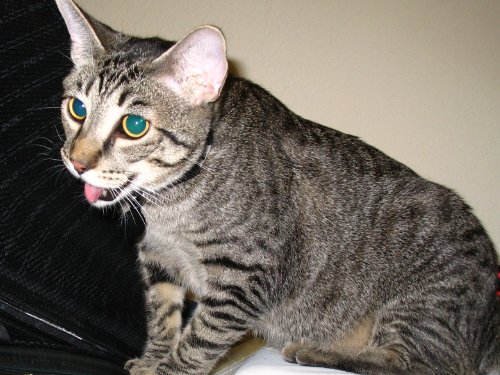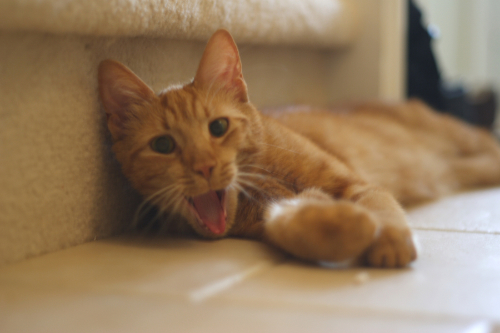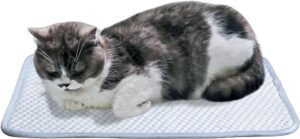How do I know if my cat is breathing fast?
You are searching the internet to find out why your cat is breathing fast. So you probably already suspect that your cat has rapid breathing. Cats typically take about 10 to 30 breaths per minute at rest. This is more with a lot of exercise such as playing. But while sleeping or walking slowly, your cat normally breathes 10 to 30 times per minute. If he breathes more often than that, he is breathing faster than he should. But that does not necessarily mean that there is something wrong with your cat’s breathing.
Measure your cat's breathing
How do you know exactly how much your cat breathes per minute? That’s quite simple. Try to observe your cat without stressing him out. Then look carefully at his chest and abdomen. You will see both of these go up and down. Then you look at a watch or clock and count the number of breaths your cat takes for 15 seconds. Multiply the number you counted by 4. After all, there are 4 times of 15 seconds in a minute. And that number is the number of breaths your cat takes per minute. But if you like it and it doesn’t make your cat nervous, you can also just count its breaths for 60 seconds.

Should I be worried if my cat is breathing fast?
Is your cat otherwise behaving normally? Is he eating well and drinking normal amounts of water? Doesn’t he drink more water than he used to do? Is he lively enough or does he look a bit off to you? If he otherwise shows normal behaviour and it is not an old cat, then you can wait and see. In older cats there is often something underlying, such as heart failure or a thyroid problem. If your cat is older and his breathing is rapid, it is best to take him to your vet. He or she can examine your cat and at least listen to his heart and lungs and feel his thyroid gland.
Why is my cat panting with her mouth open?
There are two reasons why a cat pants. First of all, healthy cats do it when they are very hot. Dogs pant quite quickly when they are hot, but cats normally do not pant easily when they are feeling warm. They simply find a place in a cool place and lie there, sleeping, waiting for the heat to pass. But cats will also start panting in extreme warm conditions. We explain why this is later.
Another reason why a cat may pant is that his brain detects that there is not enough oxygen in its blood for what it needs and too much carbondioxide. His brain then sends a signal to the lungs and the rest of the body that your cat needs to breathe more often. In this way, the amount of oxygen in his blood will increase again and the carbondioxide will decrease.
Cat panting due to heat
If a cat is hot, it will, as mentioned, first look for a place to sleep and wait until it passes. It is cooler at night, so during warm periods your cat will go hunting, especially at night, and sleep during the day in the coolest place he can find.
This way, your cat can maintain its body temperature for quite a while. But in extreme heat, your cat will at some point no longer get his body cool enough. And as you may know, a cat can’t sweat, except with the soles of its feet. And that’s why cats (and dogs) have developed a brilliantly different mechanism.
When we, humans, sweat we evaporate water and this costs energy. This energy is extracted from the heat of our body. So by sweating we remove heat energy from our body. In other words, we cool down (slightly). Cats (and dogs) use the same mechanism when panting. When they breathe they evaporate some water and that evaporation costs heat energy. Through evaporation, the body loses heat and cools down. And if you want to evaporate more moisture to cool your body, as a cat you have to breathe faster than you normally would. In other words, you need to pant to evaporate more fluid and control your body temperature when it is extremely hot.
You can help your cat cool down by placing a cooling mat for him. This absorbs your cat’s body heat so that your cat can cool down. Your cat will then breaths less fast and can sleep peacefully.
Cat is panting due to shortness of breath
Is it not warm in the area where your cat is? In that case it may be that your cat has too little oxygen in his blood compared to what his body needs. For example, if your cat plays very enthusiastic, he uses his muscles a lot. These muscles need oxygen to work and they get it from the blood. The oxygen level in the blood will therefore drop and your cat’s brain will notice this. The brain then signals to your cat’s lungs that they need to breathe faster so that the amount of oxygen in his blood returns to normal. And the reverse applies to carbon dioxide.
But what if your cat is not playing or fussing and is still breathing fast? Then there is probably a (medical?) cause why your cat’s body either consumes more oxygen or your cat’s body can’t properly absorb oxygen into the blood. In the first case, for example, there may be an overactive thyroid gland, which means that all body cells have to work too hard and your cat’s body therefore consumes more oxygen than it should. In the second case, for example, there may be a problem in the lungs, which means that less air enters his lungs with each breath and he can therefore absorb less oxygen in his blood. The result is that your cat will have to breathe faster.
My cat pants like a dog
As we wrote before, cats will breath fast or pant when they are very hot or when they have too little oxygen in their blood. If your cat also appears unfit, it is best to take him to your vet. But there are also many cats that decide much earlier than other cats to start panting, just like a dog, without anything being wrong. Your cat will then pant with its mouth open during or just after playing. Because at those times their muscles produce a lot of heat, causing their body temperature to become too high. But their muscles also need more oxygen to move properly. So does your cat otherwise behave fit? Then you don’t have to worry about your cat panting like a dog. Once finished playing, your cat will normally no longer be breathing fast.
Cat pants with his tongue hanging out of his mouth
But does your cat behave quite calmly and not actively and does it still breathe quickly? And isn’t it hot? If your cat still breathes with its tongue out of its mouth, it may also be in extreme respiratory distress. You can read more on the page about shortness of breath in your cat.

Cat breathes fast with his belly
Cats use a combination of expanding their chest and pushing out their abdomen to maximize the size of their chest cavity and thus expand their lungs as much as possible. One cat mainly uses its chest, the other mainly uses its abdomen. If your cat normally uses both and now suddenly prefers only one of the two, there is a medical reason for this. But in most cases it is normal for your cat to breathe fast with its belly. We see this a lot especially when they are sleeping and dreaming.
Can a cat also hyperventilate?
Hyperventilation is a word consisting of two parts. “Hyper” stands for “more than” and “ventilate” is another word for “moving air,” in other words, breathing. Together this stands for “breathing more”. In that respect, a cat can hyperventilate. We already explained this earlier in this article.
In humans, hyperventilation mainly occurs in response to a psychological stimulus. This has not been described in cats, as far as we know. But of course humans don’t know much about psychological problems in cats yet. However, there is a much greater chance that your cat does not have psychological problems when he is hyperventilating, but that there is a medical explanation for this.
Why is your cat hyperventilating?
As we wrote earlier, a cat can breathe faster, or hyperventilate, if it is too hot or if the oxygen level in its blood is too low.
My cat breathes fast due to stress
In case of acute stress (i.e. actually very frightened by something), your cat’s body will receive a whole wave of adrenaline. This substance ensures that the entire body is able to take a lot of action as quickly as possible. And that action requires an enormous amount of oxygen. That is why your cat breathes very quickly after that acute stress, that startle response.
However, this same mechanism also occurs in chronic stress. Chronic stress causes your adrenal glands to produce more of the hormone Cortisol. This hormone also ensures that your body can take much more action by preparing the body for it. This cortisol also ensures that your cat breathes faster.
You obviously do not need to treat acute stress, but if your cat experiences chronic stress, it is wise to address this. After all, it is bad for his entire body, not just his breathing. The best thing, of course, is to remove the source of the stress. But in many cases you don’t know what the source is. In that case you can use Zylkène tablets. These tablets provide an increased amount of serotonin in his brain in a natural way, which will make him feel better and more relaxed and therefore less sensitive to stress.
Cat breathes fast and superficial
When a cat has sufficient oxygen in its body, but a warm body temperature, it wants to pant without getting too much extra oxygen and losing CO2. In that case, a cat will breathe very superficially and quickly. As long as he otherwise behaves normally then this is nothing to worry about.
Good luck with your fast breathing cat!
Hopefully you have come to the conclusion that there is nothing wrong with your fast breathing cat. We wish you and your cat good luck!


